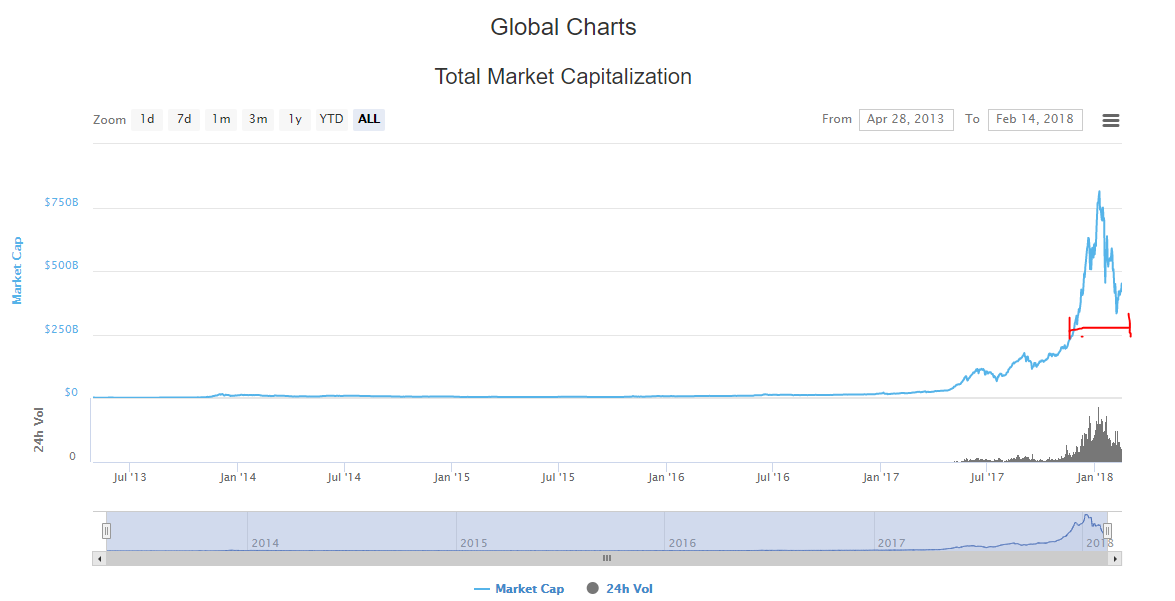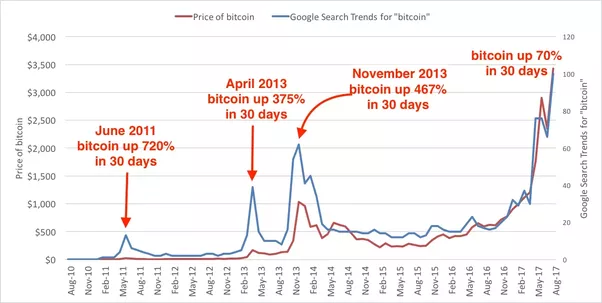Cryptocurrency Investing: Emotions and Decision-Making

Round 2: Everyone Gets Emotional at Some Point
Consider all the examples shown in Round 1 and now look at how the cryptocurrency market is currently behaving. It does look similar to a bubble burst, doesn’t it?
–disclaimer: my opinions and views are not financial advisements. I have personally invested in projects mentioned in this article–

More than 70% of the market value was wiped out in just a few days. There is one really great aspect about all this: the market is still there and most companies are still here (with a few exceptions of course). The meaning is, cryptocurrency does not have the same behaviour as other markets due to the fact anyone can easily participate (no KYC, regulation, etc) and even though currencies like bitcoin take hits of -70%, they still exist and they grow past to new price record levels.

Who were the most notorious sellers?
Take a guess! Yes, dumb money, so small investors who bought at high prices and due to the crowd feeling scared, sold at lower prices.
All the above reasons are more than important for predictive analytics and crowd sentiment analysis platforms to exist and help investors making better, more informed decisions. Below are some questions, you as an individual investor should ask, when investing in projects. Imagine how hard it can be finding the right information without the power of AI and machine learning, analyzing both open-source data and the sentiment of crowds:
1. Are news generally positive or negative regarding each coin?
2. Are people posting positive or negative comments regarding a certain coin?
3. What is the market cap vs funding spending?
4. What are the reviews and ratings for each ICO?
5. What is people’s sentiment towards the team?
6. How engaged is the community around the project?
7. What industry does the coin affect?
8. Are there many similar coins?
These are just some basic questions many investors ask themselves when deciding to re-allocate funding or investing into a new company. Sanbase-low, for example, might help by analyzing important emotional information from crowds as well as financial indicators like projects ether burn rate, market capitalization vs burn rate and other financial data.
What other factors directly influence your portfolio performance?
Besides data availability, transformation and analysis, the most important and decisive factor is the role emotions play.
“The best investors are emotionless towards an asset”
How many times have you heard this? It’s so further from the truth it hurts.
Well, not as much as Phineas Gage got hurt that’s for sure. This gentleman was a factory worker who lived during the 19th century and I will use his case as an example that, the best investors are not the ones who are emotionless, but rather the ones who can actually use emotions in a positive way during the decision-making process.
Our dear Phineas suffered a tragic event that would change his life forever, as one day while he was at work a metal bar pierced through his skull damaging his brain. Although Phineas recovered and was able to regain motor skills, his pre-frontal cortex was destroyed rendering him incapable of making decisions. His behaviour was heavily affected and his personality completely changed. Because his emotional connection to his past experiences was damaged by the accident, he became incapable of making decisions, even the most basic ones.
Antonio Damasio, a renowned Portuguese physiologist who deeply studied Phineas case published quite interesting findings . The one that I find the most important for this article is that emotion and reason are so deeply connected it’s impossible to separate one from the other.
Each decision we make is connected not only to a mental emotion associated to memories, but also to a physical feeling. That’s why we do learn from experience, mostly from mistakes: the worse, the better. If we lose that connection we become incapable of making decisions.
How can we leverage the role of emotion in the decision-making process?
That is the million dollar question isn’t it? Each of us has a different response to different stimulations. Some prefer to go with gut feelings, others with extensive data analysis and some with the wisdom of the crowds. Discarding the role emotion plays in any decision is, without a doubt, really dumb.
My advice is to leverage technology understanding in order to make better decisions. This is, if there are tools available which can help you better rationalizing an event, dealing emotionally with it and then making the best decision with the most positive outcome possible, you should definitely use them. It seems we’re starting to have the power of crowd sentiment analysis and extensive data analysis just some clicks away.
Predictive analytics can be very useful to understand how your logic holds when compared to the markets. There are already some platforms available like Stox , Augur or Gnosis . Remember Santiment? Great, use all these tools to test your feelings towards an asset. How did you do? Was it hyped? Undervalued? What about crowd sentiment, was it aligned with yours?
If you want alerts for crowd-validated news check CoinMarketCal , Snip and ClearPoll . Now, my only piece of advice for this round is:
Buy when there’s blood; sell when there’s hype.
Easy, right? Full disclosure: If it were no one would lose money on the market. Linking Round 1 with Round 2 is important so that we all can understand that any decision we make is intertwined with a bunch of emotional responses that come from experiences.
Remember the dumb money vs smart money dilemma? This is the answer:
Not ignoring your emotions and using different data analytic and crowd sentiment tools to better comprehend how you can improve emotional responses to different events.


Just compare the price action of bitcoin vs the number of times bitcoin gets a hit on google. There is, without a doubt, a clear correlation between exponential price movements and the number of people googling bitcoin as this obviously happens due to media hype (FUD and FOMO).
At the end of the day, for some investors to win, others need to lose. To be on the winning side one must first lose a great deal of battles (and most likely a bunch of money), so one learns how to better make decisions on the next round.
Leverage your experiences and emotions when making decisions and don’t be afraid to use them. Whatever feeling you might have towards an asset or an event, listen to it.
Test your hypothesis and register the outcome. Repeat until master.
Featured image from Shutterstock.